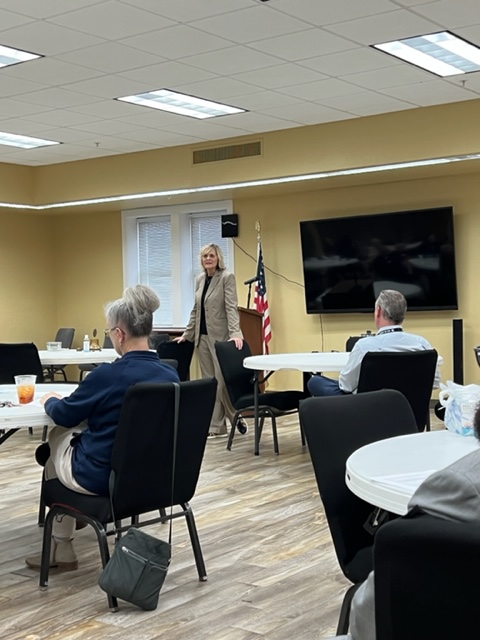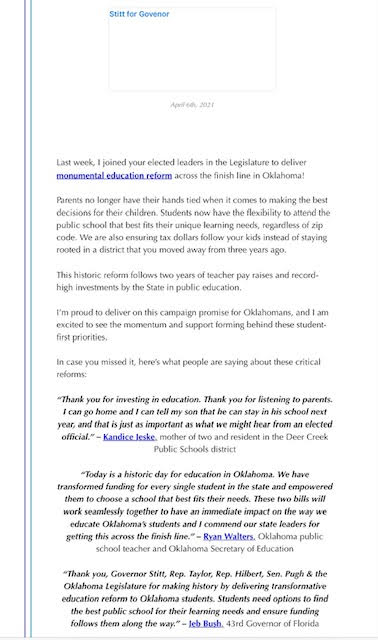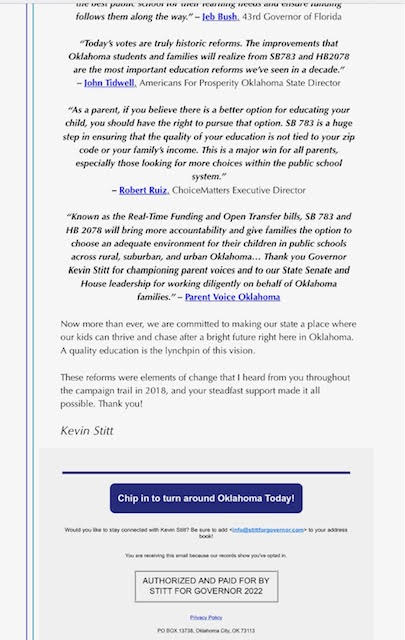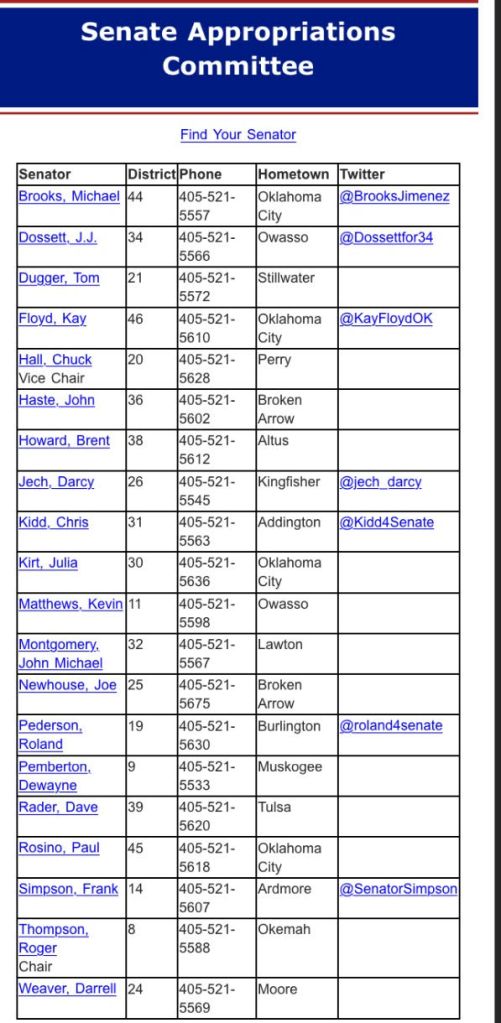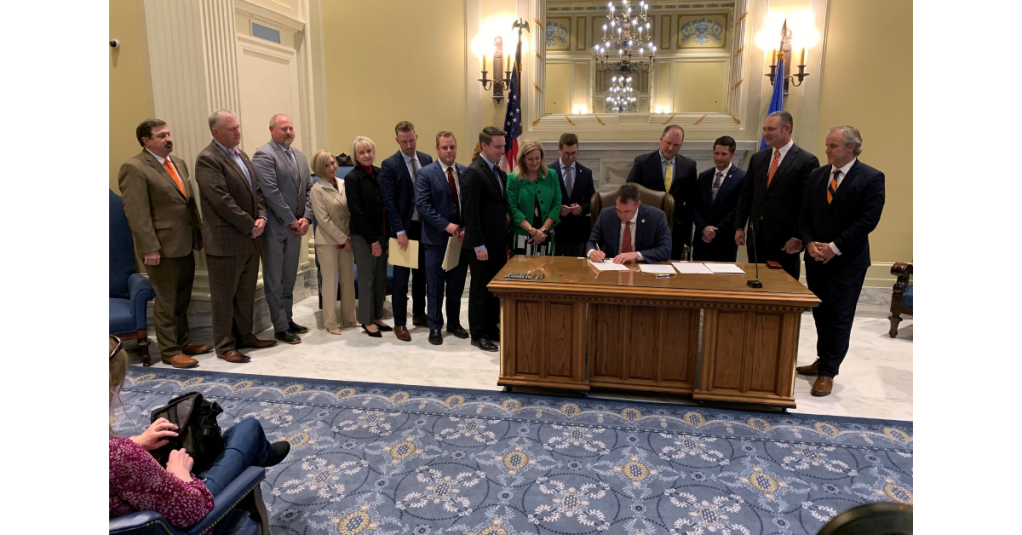Why we can’t let Walters win (pt. 1)
If you are a registered Republican who supports public education, you need to keep reading. In case you missed it, Oklahoma Secretary of Education Ryan Walters took a break from filming car videos on Thursday to set foot in the building where he’d like to have an office for the next four years. He signed up to speak during the public participation portion of the State Board of Education meeting.
He used his three minutes to trash Tulsa Public Schools, calling on the SBE to review the accreditation of TPS, and to review their superintendent’s certification. He also took a couple of jabs at the person he wants to replace, Superintendent Hofmeister, who in turn wants to replace his boss, Governor Stitt.
The SBE was already scheduled to discuss the accreditation of TPS. After receiving a recommendation from State Department of Education officials to change the district’s accreditation to “accredited with deficiency,” they decided that they would go even further, all the way to “accredited with warning.” Watching from my office between meetings, it seemed to me that at least one SBE member would have been willing to go all the way to “accredited with probation.”
The difference between these designations matters. The fact that the SBE is willing to go rogue – and that some of the board members are willing to step all the way to the edge of non-accreditation – should alarm all of us. The fact that they blindsided another district (Mustang) with only adds volume to that alarm. Nothing on the agenda indicated that Mustang was going to be receiving any kind of deficiency or warning, but that didn’t stop the SBE from giving them the exact same designation as Tulsa.
I won’t get into the alleged violations of HB 1775 in Tulsa or Mustang. In spite of everything that has been posted to social media since the SBE meeting, I don’t have a good feel for the sequence of events. The SBE didn’t discuss any evidence they reviewed. No representatives from the districts were there to explain what happened or discuss what they have done since the alleged violations. As a superintendent, I understand that there are times you can’t share all the information you have. For the SBE, this would not have been one of those times.
All we really learned Thursday is that the governor’s chosen candidate for State Superintendent and most of his appointed SBE members want us all to be on notice. If we cross them, they will come after our districts. They will come after our certificates. They don’t even have to have evidence or give you a chance to defend yourself.
It was nothing less than a shot across the bow for all of us.
**********
Going into June’s Republican primary, I wrote about why I support Dr. April Grace for State Superintendent. As I said then:
In Oklahoma, the Superintendent of Public Instruction is an elected position. The state constitution lists no qualifiers for the position other than age and residency. As a life-long, fourth-generation Oklahoman, as a 29 year educator, and the son of a retired teacher, I’m looking for the candidate who I believe can help students, help public schools, and help communities thrive over the next four years.
I was nice in the post. I only said positive things. One of the other primary candidates, Dr. John Cox, is a friend and fellow superintendent as well, and I would have happily supported him if he had won. We need an educator with strong leadership experience running education in the state. I was less enamored with the other candidates, but I kept my thoughts on them to myself.
Now that we are headed towards a run-off election on August 23, I want to contrast the candidate I prefer with the alternative. I want to make it clear to educators and to all Oklahomans who support public schools that Ryan Walters is dangerous. He is unprepared. He is a puppet of individuals and groups hell-bent on destroying public schools. As the editorial board for the Stillwater News Press wrote this weekend:
It’s increasingly apparent that the goal for people who have been placed in oversight roles for public education in Oklahoma are deliberately trying to undermine it in the interests of privatization. They’ve sold a bill of goods to parents that they are trying to root out “leftist indoctrination” and “woke” ideologies but the latest action gives further evidence that the game is rigged.
This is why we all need to care. This is why we all need to vote. We have 23 days until the runoff between Dr. Grace and Mr. Walters. We get to choose between someone who supports teachers and school leaders and someone who denigrates the hard work they do. We get to choose between someone with decades of experience and someone who received his position in state government in order to serve the desires of people trying to wreck the hard work of Oklahoma’s educators.
A couple of weeks ago, I started toying around with the idea of a #TopTen list of reasons not to vote for Walters. I haven’t had a prolific blogging month in a while, but this moment probably calls for it. The problem I’m running into is narrowing it down to ten.
Over the next three weeks, I’ll make my case, as one voter, as one educator, and as one life-long Oklahoman who cares deeply about the future of our state and profession. To anyone else with a platform, I implore you to do the same.
We have 23 days.
Why I support April Grace for State Superintendent
Before you become a school district superintendent, people tell you that you will be on an island. You’re the only one in your organization with that title. While that may be true of other people as well, they all answer to you. You may make deep abiding friendships, but ultimately, no matter how good your team is, you’re the one on the hook for the tough decisions.
When I became a superintendent seven years ago, one of my first challenges was to find colleagues with enough experience to help me get my feet on the ground. I wanted to befriend newly-appointed superintendents as well, since my neurotic fear was that I’d call up veteran superintendents and that they would laugh at my questions. (None did – at least not that I ever heard about.) I wanted to turn my island into an archipelago.
I made a few close connections right away, and then the next year, when April Grace became a superintendent, we became good friends as well. Over the years, I’ve gathered a list of dozens of peers that I can call on a moment’s notice. Sometimes we plan around weather forecasts together. Sometimes we call to lift each other up during hard times.
When I have tough questions and want to process out loud with someone else whose perspective I respect, my first call is usually to April. She has been a teacher, coach, and principal. She had a long tenure running HR in one of the largest districts in the state. As I have, she has worked in urban, suburban, and rural school districts. She gets large budgets and complex organizations.
April is also usually the first person to call me up just to check on me when something bad happens. Her kindness and empathy put her in a separate class. She has given me invaluable advice; on occasion, she has even picked my brain for expertise.
In Oklahoma, the Superintendent of Public Instruction is an elected position. The state constitution lists no qualifiers for the position other than age and residency. As a life-long, fourth-generation Oklahoman, as a 29 year educator, and the son of a retired teacher, I’m looking for the candidate who I believe can help students, help public schools, and help communities thrive over the next four years.
That is why I will be voting for April Grace in the Republican Primary on June 28.
Our statewide system of public education is complicated. No two districts are the same. April’s varied experiences will help her lead it. She has built a strong network of support with leaders throughout the state. She pays attention to details and understands the intricacies of school law. Most importantly, she cares.
I’ve said for years that most of us would rather do anything than pay attention to politics. That’s still true, even when public educators are under constant attacks from politicians. I don’t want to focus on any of that right now – just the person I believe is best-equipped to lead the system of public schools that we have in this state. April will lead us back from the pandemic years, work closely with the Legislature, and bring schools and parents together to work for the best interest of children.
Please vote on June 28. Do your research and pick a person with experience and integrity.
An Open Letter from the Jealous Cabal
In case you haven’t heard yet, the State Board of Education (SBE) approved a settlement with the Oklahoma Public Charter School Association during their March 25 Board meeting. Against the advice of their in-house counsel, the SBE voted 4-3 essentially to allow charter schools to have access to local revenue, in addition to the state revenue they already receive.
I’m not going to rehash that decision, which for the record, I find problematic. Instead, I’d like to address the multi-faceted defense of that decision that seems to rest on the shoulders of the newest member of the SBE, Trent Smith.
Smith made the motion to approve the resolution settling the lawsuit and has been its most vocal proponent. This weekend alone, he appeared on News 9’s The Hot Seat with Scott Mitchell and penned a letter to the editor that appeared in the Tulsa World.
The letter in the World was pretty straightforward. He simply stated that the resolution rights a mis-application of state law. Those of us opposed to the settlement disagree and point to the original intent of the charter school movement, which leaned on public-private partnerships for the funding of charter schools.
Smith’s interview with Mitchell, however, was quite a journey. I watched it a few times, took some notes, and have comments. Let me unpack a few direct quotes from the five-minute segment.
“Not only was [the settlement] not a mistake; it was to a large degree, premeditated.” – (0:40)
What exactly does Smith mean by premeditated? That’s usually not a term used by someone defending their actions. We know that the SBE met in an executive session for four hours, discussed a number of items, and then came back with this resolution. He read the motion from his computer screen. Does he mean that the decision to contradict their lawyer’s decision was made prior to the meeting?
“The public education cabal, if you will, that has been in existence for decades and decades and decades, they’re interesting in protecting the status quo.” – (1:40)
No, we’re interested in educating children.
What really got me going today was the word, cabal. And to be honest, I think it was used intentionally to be provocative. It worked. I’m provoked. My friend, Matt Riggs, superintendent in Macomb, tweeted about it, which is how I became aware of the Mitchell-Smith discussion in the first place.
Merriam-Webster defines cabal as “the contrived schemes of a group of persons secretly united in a plot.” I also vaguely remember an 80’s era video game called Cabal.
I really don’t know what we’re doing that is in any way a contrived scheme or secretive. Oklahoma education advocacy groups and district leaders have been openly vocal about their thoughts on the SBE settlement. Many districts, including mine, have either approved, or plan to approve, legal action over this decision. We post this to our local board agendas, which aren’t exactly hard to find.
While I agree with Mr. Smith about preferring a legislative solution to a litigated one, that could be many things to different people. And I’m all for those discussions being had in the light of day.
Not in an executive session. And certainly not in a premeditated manner.
“I don’t think it’s any secret, and they don’t like to talk about this, that Oklahoma’s public education system is always near the bottom of the barrel….There’s only 50 states, and we can’t seem to get above 45th, 42nd, 48th.” – (1:50)
At this point, Smith lays down tracks for the rest of his comments. Our schools are bad and need competition.
I’ve been a public school educator for 28 years, and I’m the son of a retired teacher. I’ve been hearing that my whole life. I’ve also been hearing my whole life about how poorly funded Oklahoma’s schools are compared with the rest of the country. Yes, our Legislature increased its investment in education in 2018 and 2019. After a decade of – at best – flat funding, we made up some ground that we quickly lost to other states.
Our state has a long history of not supporting public schools. Then our leaders blame the schools for not being in great shape – similar to how we as society tend to blame poor people for not having money.
Ever since HB 1017 passed in 1990, wealthy and well-connected influencers around the state have been trying to demonize public education and the people who work every day to educate our children. But sure, we’re the cabal.
“The Academy of Seminole has done a great job graduating a vast majority of their graduating class this year – their first graduating class. The majority of those students will graduate with associate’s degrees.” – (2:25)
That’s fantastic! It’s worth mentioning, though, that Seminole High School, the local traditional public high school, posted a 100% graduation rate in 2019. The state average that year was 97.2%.
It’s also exciting to see that they promote early college access, as do most high schools in Oklahoma. I’m not sure why Smith thinks that’s unique. Our public school districts have agreements with career tech centers and higher education institutions that allow a multi-directional educational path for students and a springboard into postsecondary life.. Oklahoma’s high school juniors and seniors regularly earn college credit and even industry certification before graduation. The Academy’s specific focus on this is noteworthy, and a good example of how charter schools can target a family’s specific interests.
“As a parent with two children in Yukon Public Schools, it’s time that we step out of the Stone Age and a public education system that was designed to produce industrial workers.” – (2:45)
I’m going to come back to this one in a few paragraphs, but I’m pretty sure that there weren’t many industrial workers during the actual Stone Age.
“What we have now is Henry Ford vs. horses. We have a public education system trying to protect the horses. And we’re trying to make automobiles. And it’s just like, do you want to use a landline or a cell phone?” – (3:05)
If you can hear my exasperated sigh, it’s because I thought we did a better job teaching simile and metaphor than that in our public schools. Maybe we’re 45th, 42nd, 48th at that as well. I get that Smith, as a new member of the SBE, may not be fully up-to-speed on all the current lingo. We’re laser-focused on collegeandcareerreadiness. One word. It rolls off the tongue.
Oklahoma’s public schools do a good job of getting students ready for college. Or careers. Or the military. Or something. One way or another, we spend a considerable amount of time preparing students for whatever it is that comes next. Not every student will graduate knowing how they want to spend the next 40-50 years, and that’s fine. They all need to graduate at least knowing what they can do while they’re figuring that out.
As schools that are part of the public state system, we have to follow state standards, prepare students for state tests built around those standards, and conform to countless legislative whims that tie us back to another era. As much as I’ve seen public education evolve during my career, sometimes I feel like the only thing holding us back is state government. We’re not teaching Henry Ford’s horses to use the landline, exactly, or whatever the point of that sentence was.
“We need to completely re-think how we’re educating our kids, and in my opinion, the settlement we were able to pass in the board meeting at the end of March is just one small step towards the greater reforms that really need to happen.” – (3:20)
Please, Mr. Smith, do continue. I’m sure that we’d all love to hear about the greater reforms you’d like to see implemented.
“…[Rep. Hilbert’s Bill] would solve the two main problems the education establishment has with our settlement, which is the funding of virtual charter schools, and let’s all be honest, they’re talking about Epic, which I think has done a fantastic job. 60,000 families in Oklahoma have chosen to send their children there.” – (4:10)
Well, 60,000 students were enrolled in Epic in October. After the statewide enrollment count, however, many returned to their local districts. This happens every year.
Besides, didn’t Smith brag on the Academy of Seminole’s graduation rate as evidence of the great job they’re doing? According to a 2019 article posted on The Frontier, Epic had a graduation rate of 40%. That’s not fantastic.
“I don’t think they should vote to dissolve that entity. I think that the problem is a bunch of jealousy. I think there are people who are mad that they’re losing students. And a lot of that is because they’re having to compete for the first time.” – (4:25)
I really want to know who told Smith that anytime people don’t like you it’s because of jealousy. Sure, if you win all the time like the Yankees used to, everyone else will despise you. But sometimes – and stop me if this sounds ridiculous – people don’t like you because of legitimate grievances over the things you do.
I personally have no ill will towards the statewide virtual charter schools that aren’t currently under state or federal investigation. And I feel no particular jealousy towards the teachers who work for Epic or the students who attend their schools. I want every student in Oklahoma to get a good education. And yes, I want families to have agency in determining what that should look like for their children.
That’s why I’m not against charter schools. I just prefer the original model that relied on private-public partnerships. And it’s why I’m not against school choice. I just prefer not to use that term as an umbrella that includes voucher programs for private schools, where the choice is still in the hands of the private schools, rather than the families.
“Oklahoma’s workforce isn’t doing so great, and a lot of that is because of the education system that we currently have in place.” – (4:55)
Is that the industrial workforce or the stone age workforce? And while we’re at it, what else do you want to blame on public schools? Bad weather? Earthquakes? Cottonwood pollen and the offensive smell of Bradford Pears?
Governor Kevin Stitt appointed Smith to the SBE in December, replacing a member who did not vote as the governor had wanted. If the SBE had voted as their legal counsel advised them to, I imagine we would have seen a rinse and repeat of that maneuver. We’re in a state right now that requires absolute fealty to its chief executive. Disagree and be gone.
During the interview, Smith briefly touches on being a product of Clinton Public Schools and the fact that his children are in Yukon Public Schools. I don’t think he’s against public schools. I genuinely think he wants them to be re-imagined, and that’s fine. Unfortunately, provoking and insulting those of us who have chosen public education as a profession won’t transform us into a #toptenstate.
The 10 Most Important Slides from the State Auditor and Inspector’s Epic Presentation
Yesterday, State Auditor and Inspector Cindy Byrd’s gave a virtual presentation over her office’s findings in the investigation of Epic Charter Schools. The 45 minute video is now all over the World Wide Web Web and continues to be shared. It should also be required viewing for all educators parents, and … well, taxpayers. And probably legislators.
As important as the presentation is, I know that the tl;dr phenomenon applies to video content as well. I taught high school English long enough to understand that just because I assign it, doesn’t mean you’ll read all of it. That being said, let me cut it up into bite-size pieces for you.
I have taken screenshots of what I think are the ten most important slides from Auditor Byrd’s presentation. I’ll do my best to summarize them, but honestly, watching the whole thing (with captioning), is really worth it. After watching it in the morning, I even kept it on loop again yesterday afternoon while working in my office.
1. Governor Stitt initiated the audit process, writing to Auditor Byrd, “I respectfully request an audit of Epic Charter School and all related entities.” This isn’t the first slide in the presentation, but I’m doing the first two in reverse order. Too many times, I’ve seen the state’s leading far-right think tank accuse Epic’s detractors of being anti-choice.
Hardly.
This audit, which began six months into Stitt’s term, is about assuring that tax dollars go where they’re supposed to.
The other notable part here is that Stitt addresses not only Epic, but also all related entities. As Byrd demonstrates clearly, there is very little – if any – space between these entities.
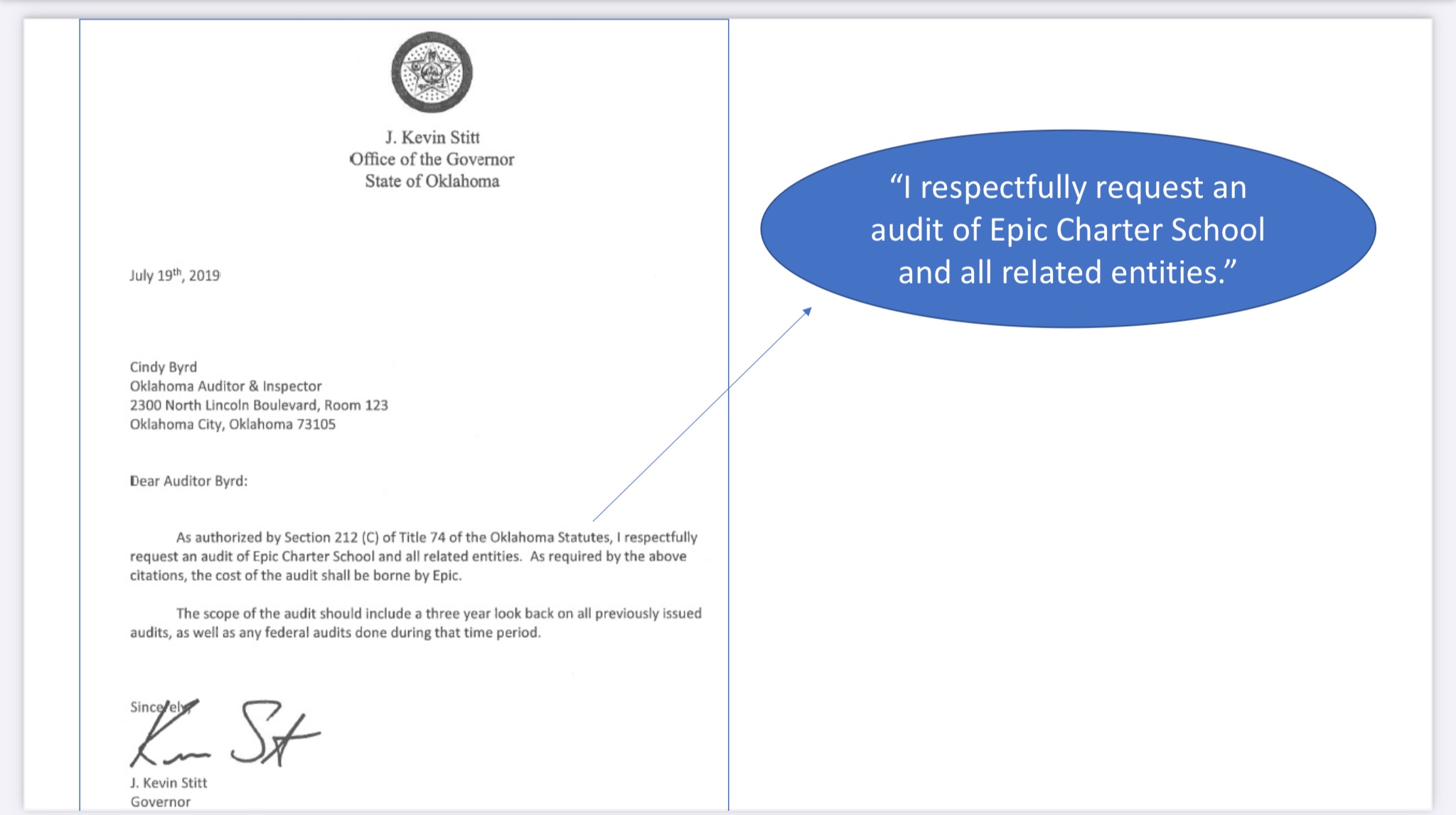 2. The Oklahoma State Bureau of Investigation was already investigating Epic before the governor wrote to Auditor Byrd. The search warrant below was issued three days before the governor sent that letter. I’m not a lawyer, but embezzlement and racketeering both sound pretty serious.
2. The Oklahoma State Bureau of Investigation was already investigating Epic before the governor wrote to Auditor Byrd. The search warrant below was issued three days before the governor sent that letter. I’m not a lawyer, but embezzlement and racketeering both sound pretty serious.
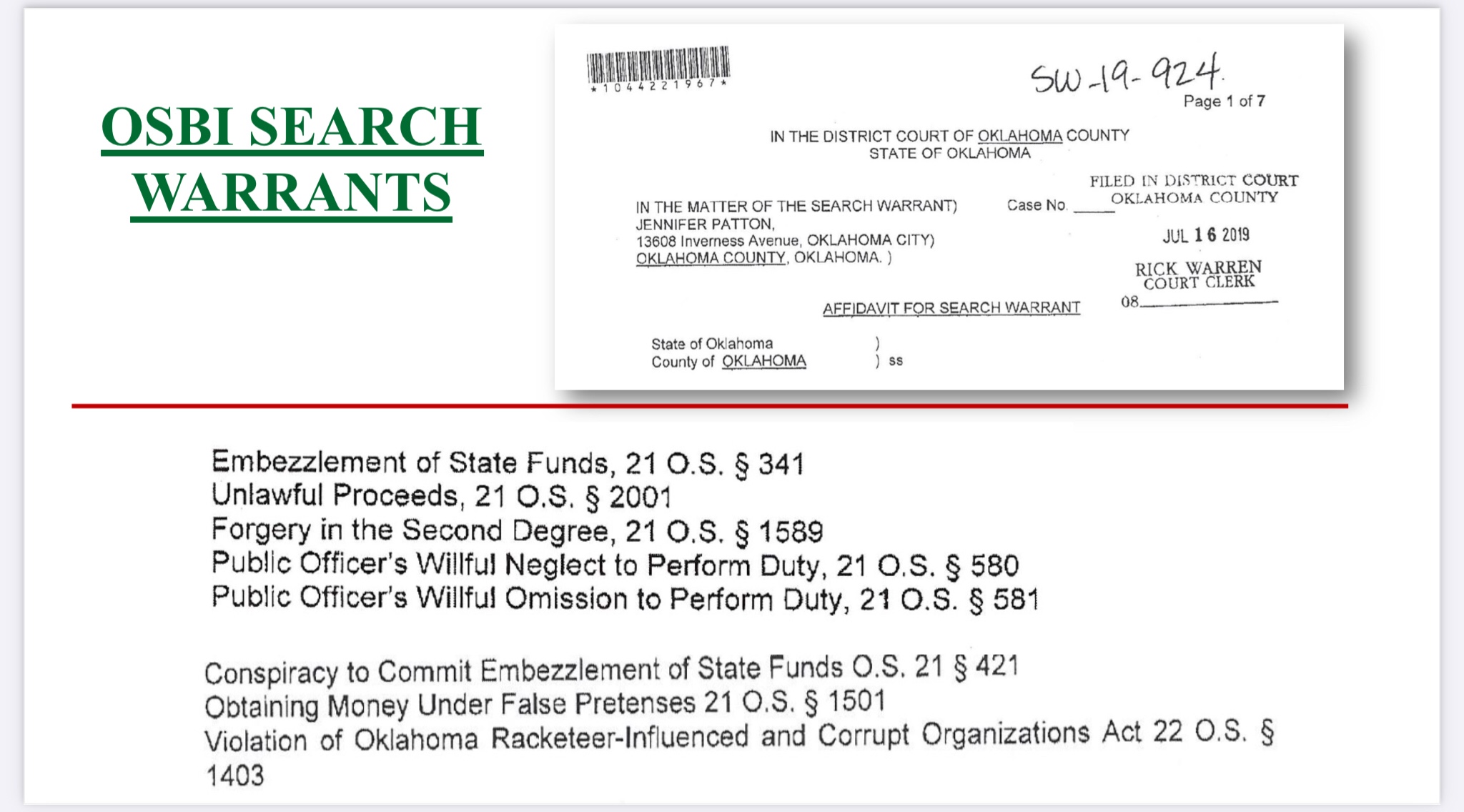 3. Epic Youth Services received a PPP loan for $42,700. On first glance, it’s a fairly small amount. But Epic Youth Services reported to the Oklahoma Employment Security Commission that they had zero employees from 2010 through 2018. Then in 2019 they hired two lobbyists. Epic Youth Services, which takes 10% of all of Epic’s state aid, now apparently has three employees and needs federal Covid relief funds to keep them on the job – whatever job that is. Auditor Byrd doesn’t seem to think that the operating agreement makes that clear.
3. Epic Youth Services received a PPP loan for $42,700. On first glance, it’s a fairly small amount. But Epic Youth Services reported to the Oklahoma Employment Security Commission that they had zero employees from 2010 through 2018. Then in 2019 they hired two lobbyists. Epic Youth Services, which takes 10% of all of Epic’s state aid, now apparently has three employees and needs federal Covid relief funds to keep them on the job – whatever job that is. Auditor Byrd doesn’t seem to think that the operating agreement makes that clear.
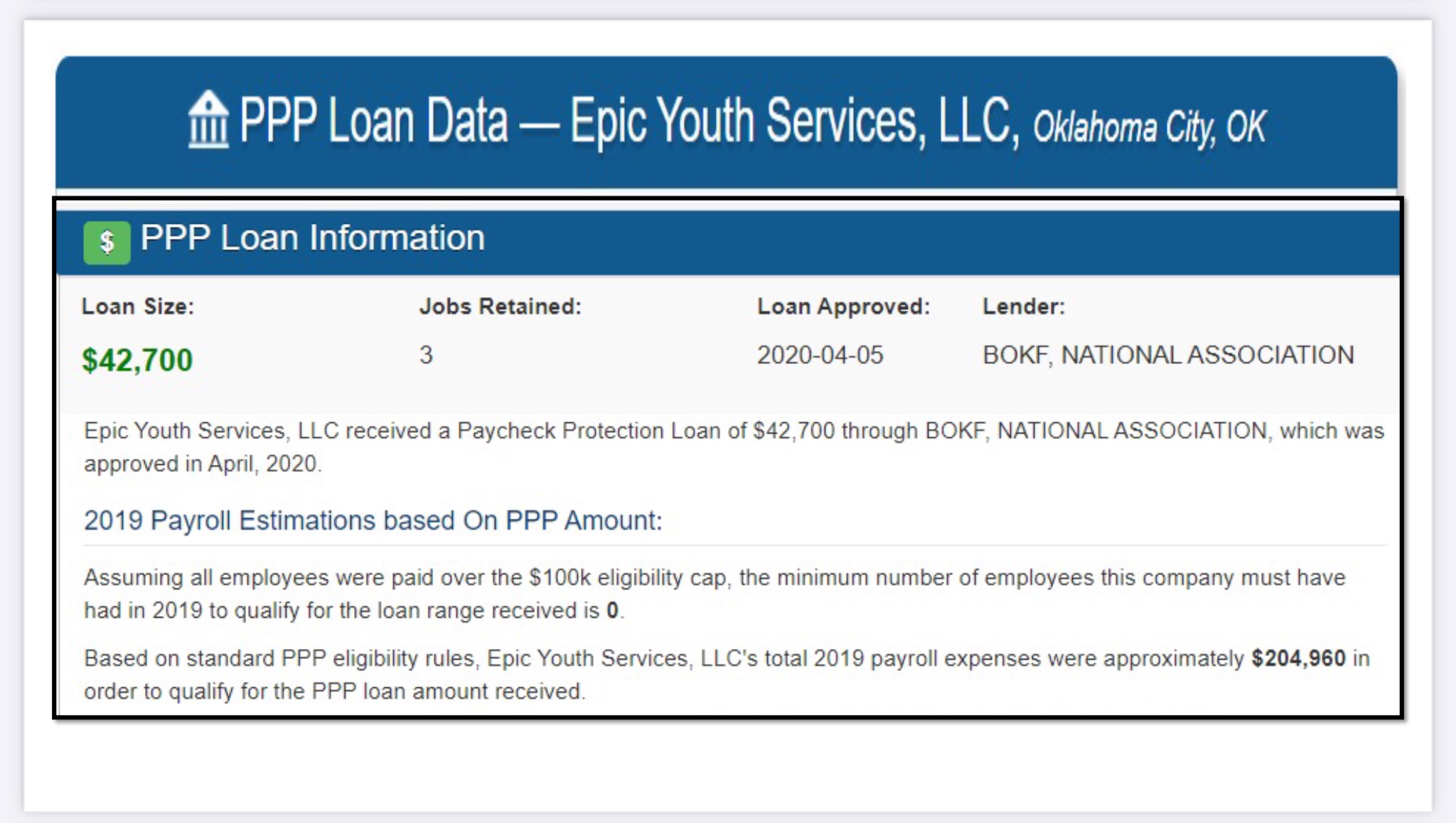 4. Epic One-on-One (full-virtual) and Epic Blended submit identical invoices every month. That’s right. The percentages you see below are identical for the all-online school and for the brick-and-mortar school. I’m also not sure what child nutrition services are needed for Epic One-on-One, and why EYS bills them for it every month. One more thing…if they have three employees, none of which are certified teachers, what are the certified salaries?
4. Epic One-on-One (full-virtual) and Epic Blended submit identical invoices every month. That’s right. The percentages you see below are identical for the all-online school and for the brick-and-mortar school. I’m also not sure what child nutrition services are needed for Epic One-on-One, and why EYS bills them for it every month. One more thing…if they have three employees, none of which are certified teachers, what are the certified salaries?
If Epic has their way, we’ll never know. They claim that all the funds that go to EYS are private once the check clears. I get the premise. That’s like saying when my district’s milk check to the dairy clears, it’s not state money anymore. On the other hand, we still haven’t clearly established why Epic is buying milk for virtual students. In any case, the identical monthly invoices are fishy.
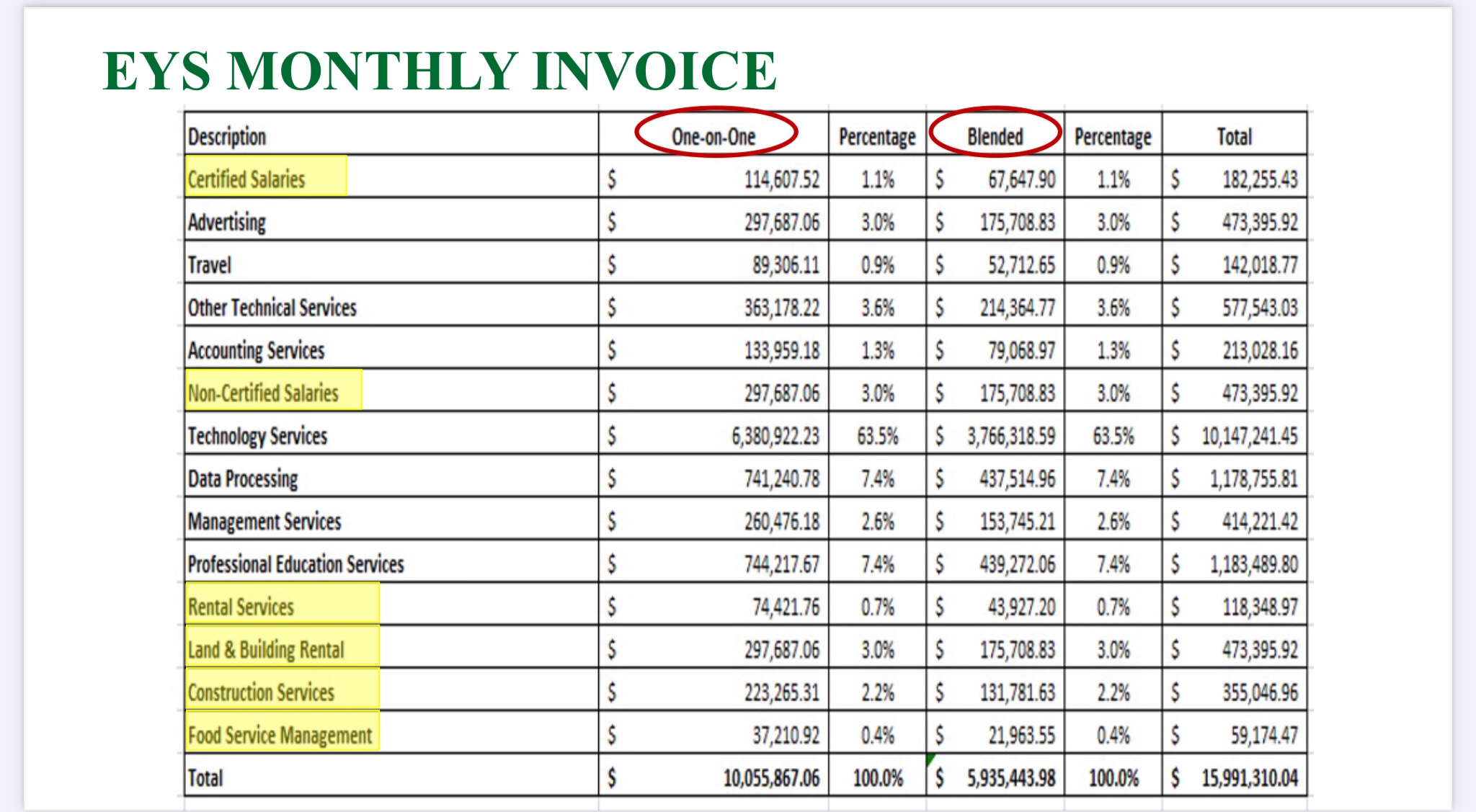 5. Epic claims the state can’t audit $125 million in funds that were allocated from 2015-20. On top of the 10% management fee that goes to EYS, Epic withholds $1000 per student for their “learning fund.” They have provided examples of use and ranges of expenses, but they have not brought receipts. As Byrd says in the presentation, “During the course of the audit more than $125 million of student educational funds were transferred to a company with no transparency and no accountability.”
5. Epic claims the state can’t audit $125 million in funds that were allocated from 2015-20. On top of the 10% management fee that goes to EYS, Epic withholds $1000 per student for their “learning fund.” They have provided examples of use and ranges of expenses, but they have not brought receipts. As Byrd says in the presentation, “During the course of the audit more than $125 million of student educational funds were transferred to a company with no transparency and no accountability.”
Again, how is anyone ok with this? If you believe in school choice, don’t you worry that this hurts your cause? If you believe in fiscal responsibility, why aren’t you outraged? Every other school district has to keep a paper trail of every dollar we spend.
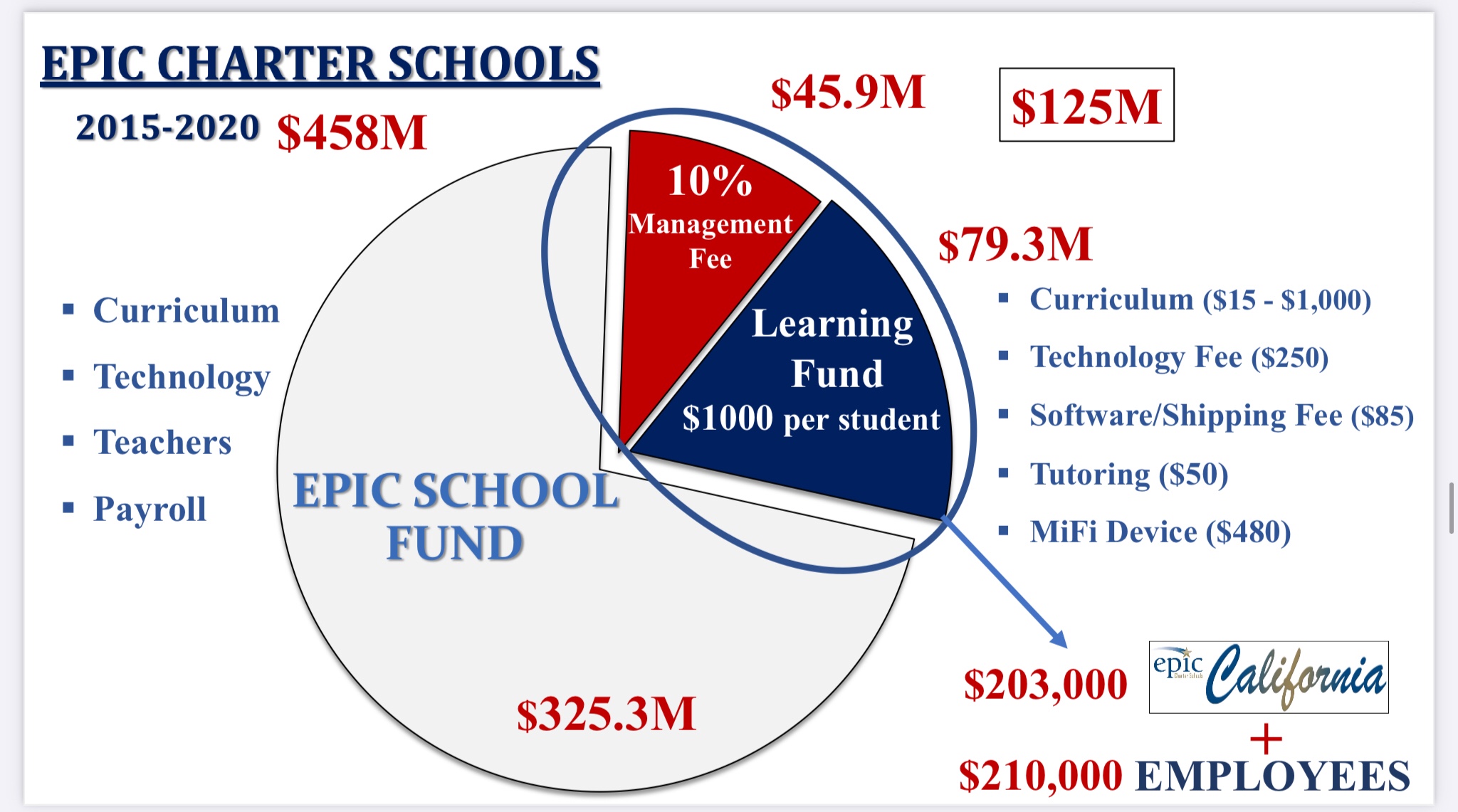 6. Byrd’s office has to deal with five separate law firms that Epic employs. This explain why the State Auditor and Inspector’s office has had to issue more than 50 subpoenas to date. Byrd says that responses have been late and incomplete. The next part of the investigation can’t move forward until a judge rules whether or not the learning funds are public funds and therefore subject to audit.
6. Byrd’s office has to deal with five separate law firms that Epic employs. This explain why the State Auditor and Inspector’s office has had to issue more than 50 subpoenas to date. Byrd says that responses have been late and incomplete. The next part of the investigation can’t move forward until a judge rules whether or not the learning funds are public funds and therefore subject to audit.
Five law firms. Just wow.
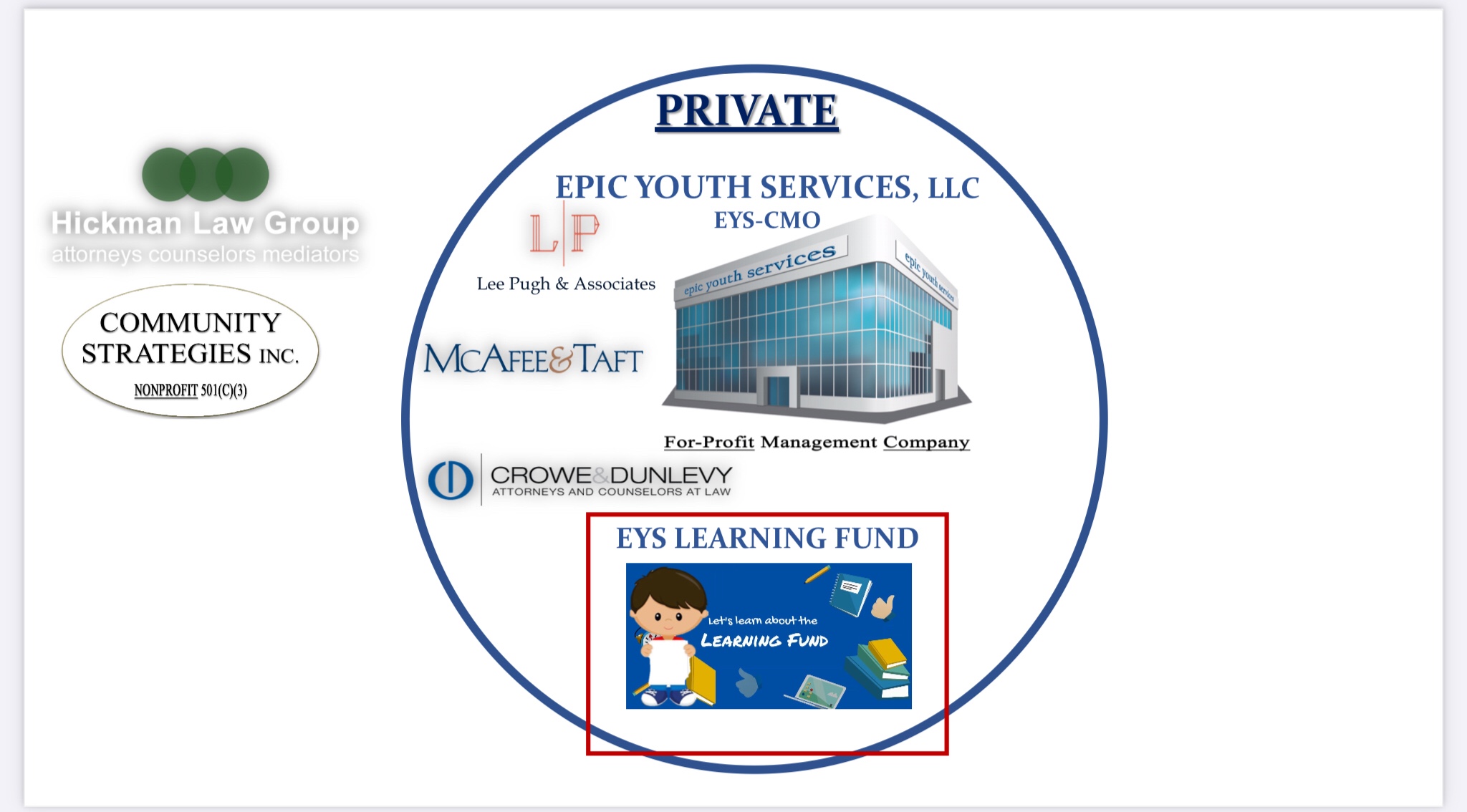 7. For the current school year, about $90 million more of state funding is hidden from view. We all knew that Epic (and other statewide virtual schools that apparently don’t self-deal with their own parallel companies like something out of Ozark) was going to gain students during the pandemic. That only increases the onus for transparency. Apparently, it also cranked up the necessity on the part of Epic to avoid it.
7. For the current school year, about $90 million more of state funding is hidden from view. We all knew that Epic (and other statewide virtual schools that apparently don’t self-deal with their own parallel companies like something out of Ozark) was going to gain students during the pandemic. That only increases the onus for transparency. Apparently, it also cranked up the necessity on the part of Epic to avoid it.
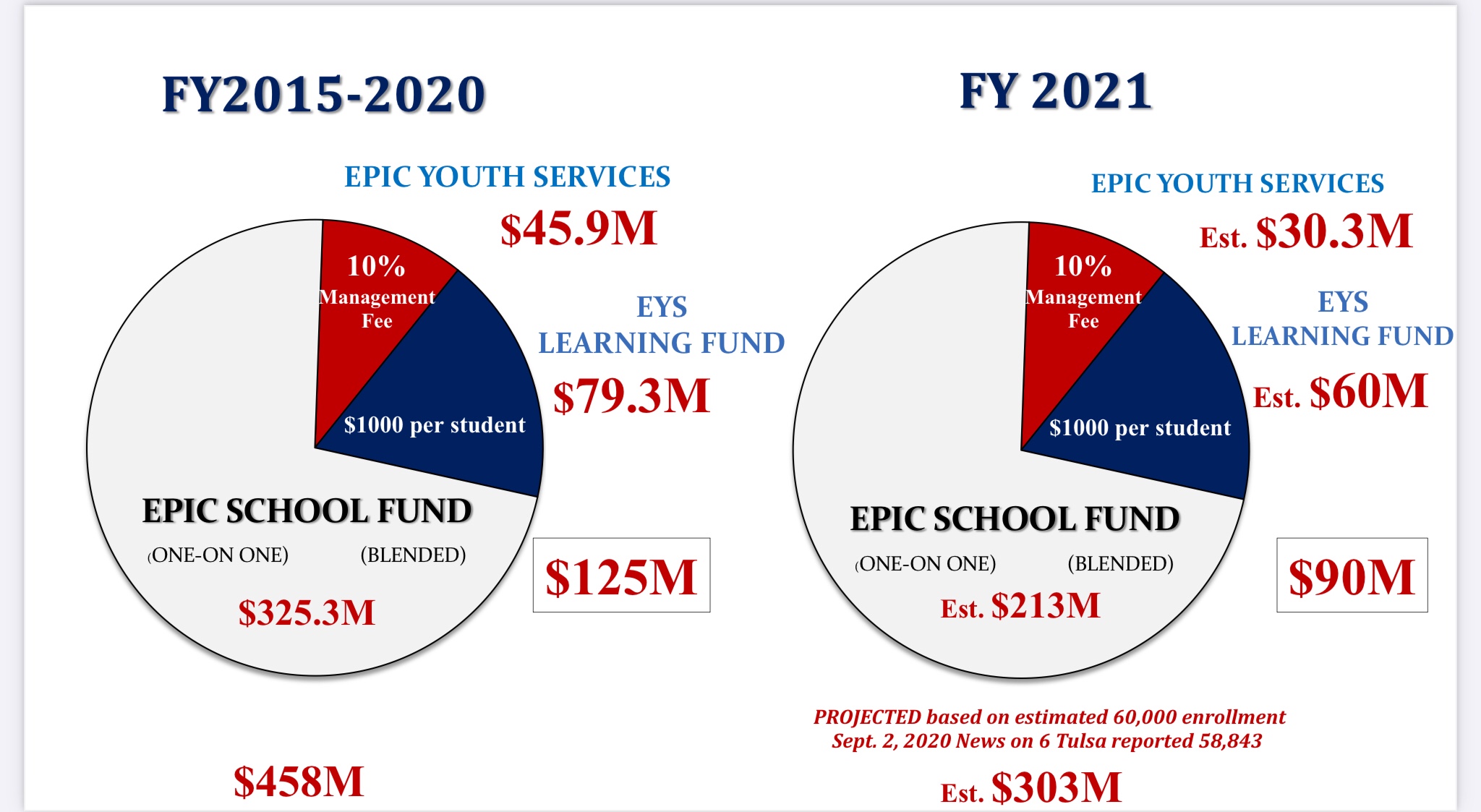 8. The scope of the audit is actually narrow. Byrd isn’t saying that charter schools, virtual instruction, or school choice more broadly are bad concepts. Again, it’s important to remember that our most school choice forward governor ever requested this audit.
8. The scope of the audit is actually narrow. Byrd isn’t saying that charter schools, virtual instruction, or school choice more broadly are bad concepts. Again, it’s important to remember that our most school choice forward governor ever requested this audit.
I know good teachers who work for Epic. This isn’t a knock on the work they do or an attack on their character. This audit report questions the legality and ethics of the actions of Epic’s leaders.
For the record, I’m not against charter schools, virtual instruction, or school choice, other than vouchers for private schools. Discussions of school choice aren’t binary. And we shouldn’t paint charter schools with a singular brush.
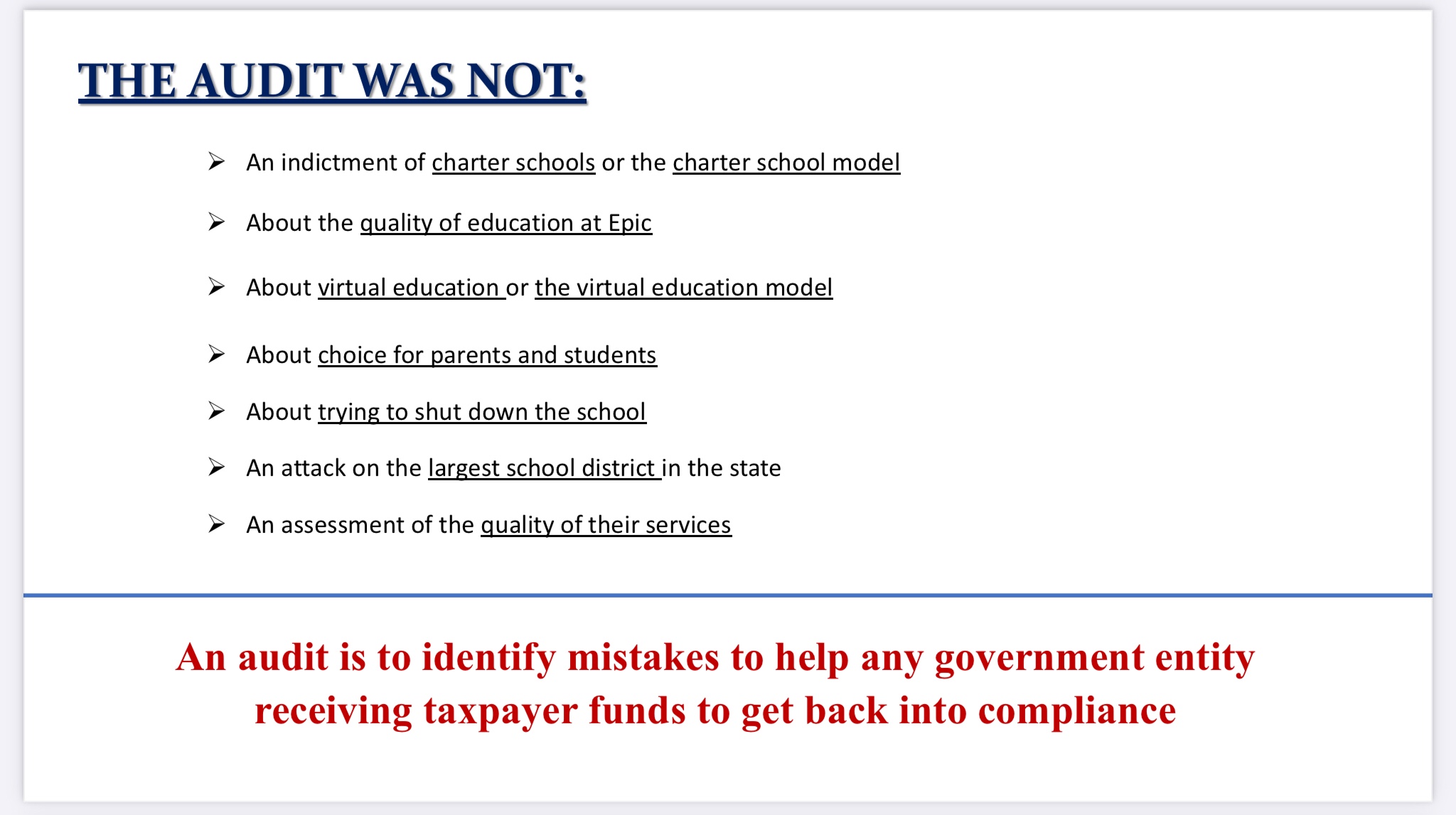 9 & 10. Senate Bill 895 is sketchy. Shortly after Byrd’s office released their findings, Senator Paul Rosino (R – OKC) filed a bill that would strip her office of the authority to perform this kind of audit. Imagine an agency under investigation being able to choose their own investigators. Worse yet, this bill is based on suggestions of Epic’s co-founders.
9 & 10. Senate Bill 895 is sketchy. Shortly after Byrd’s office released their findings, Senator Paul Rosino (R – OKC) filed a bill that would strip her office of the authority to perform this kind of audit. Imagine an agency under investigation being able to choose their own investigators. Worse yet, this bill is based on suggestions of Epic’s co-founders.
Byrd’s office released her findings on October 1. As the Tulsa World points out, Rosino’s campaign received donations from Epic people on the 2nd. Then he filed this bill. Yeah, it probably means nothing.
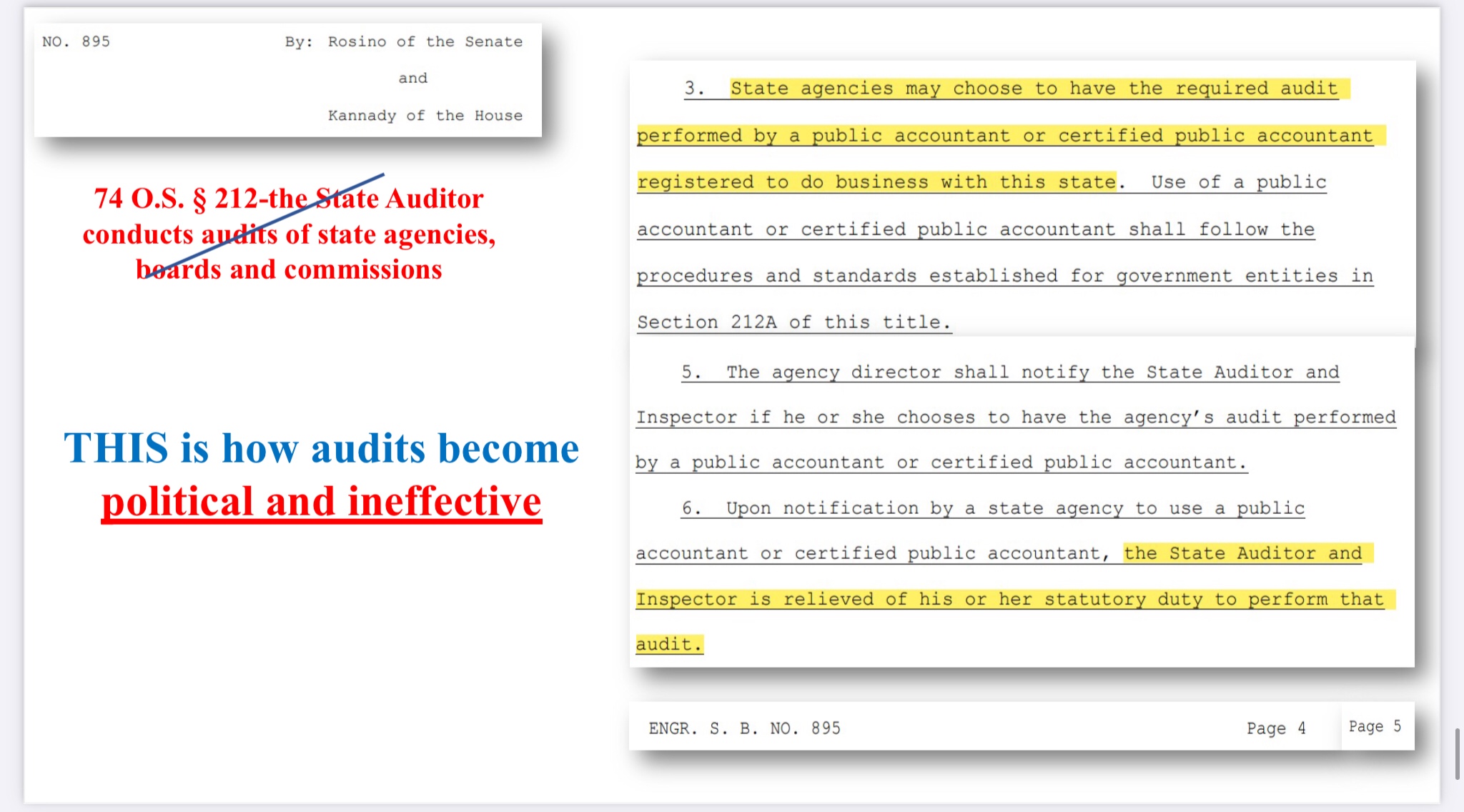
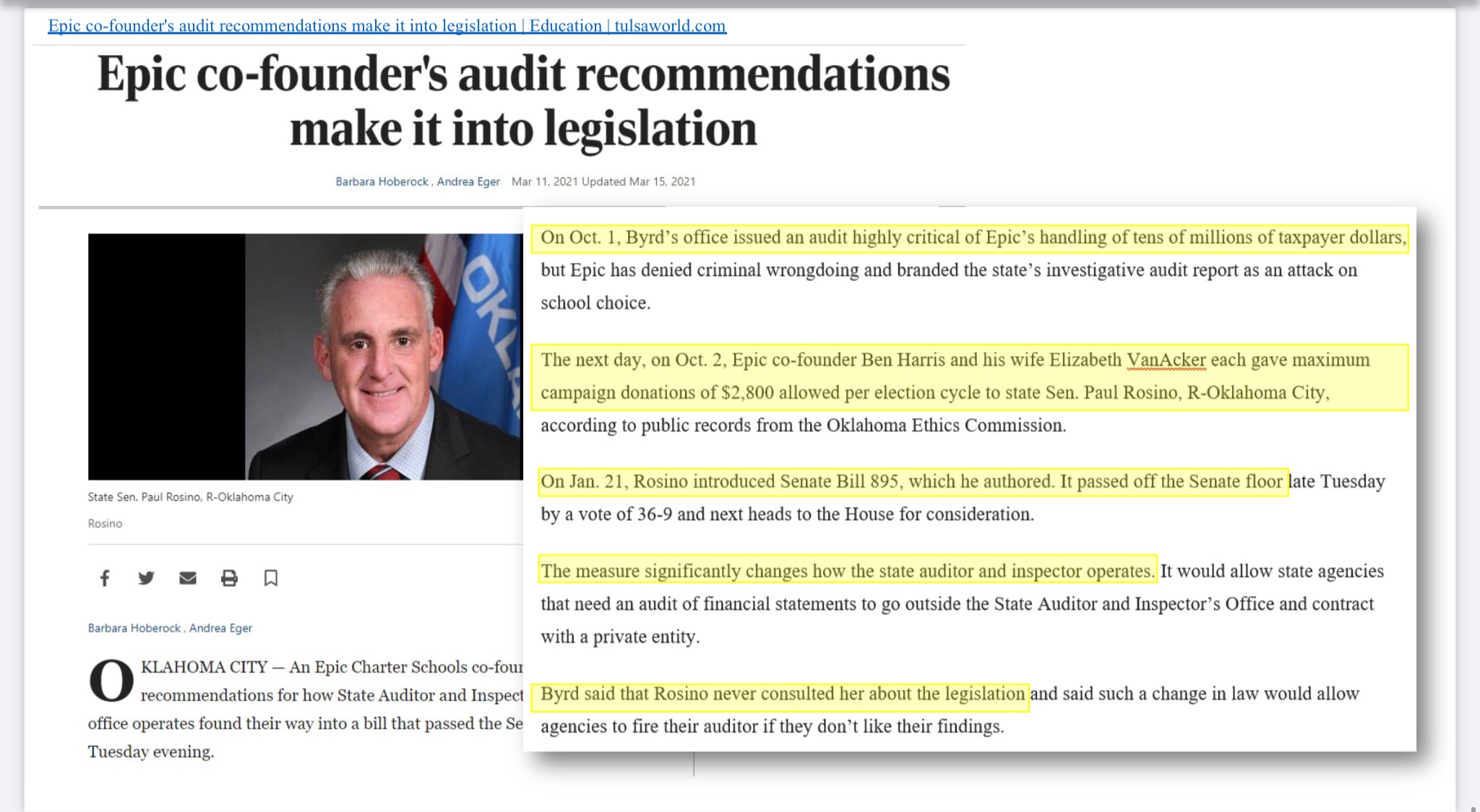
Again, I can’t urge you strongly enough to play the video. Just keep it on in the background while you’re cooking dinner or answering email. Break it up into chunks. Turn it into a Reader’s Theater for your drama class.
Well, maybe don’t do the last one.
This is a very big deal, and we can’t quit asking for accountability. SB 895 has already passed the Senate and is now waiting to be heard in committee in the House. We can’t be complacent about this.
Contact your representative. Tell a friend to do the same.
On Numerators and Denominators and the Reckless Redistribution of School Funding
Last week, during debate over HB 2078, Sen. Greg Treat (R – OKC) waxed nostalgic over his younger days when he was a mathlete in school. In discussing the way he feels school funding should be distributed, he made sure we all understood numerators and denominators.
I felt like I was watching a scene from Real Genius, which I probably did later in the week. I mean, the movie holds up so well all these years later.
Not many people know this, but I too was a mathlete back in the day. In today’s political climate, I think my teachers probably would have been forced by law to reveal that information to my parents if they suspected it. Sure, I had a C in Algebra, but I did have all those MathCounts trophies.
I’m digressing, but in my defense, it’s early, and I didn’t think I was going to be writing this morning, but a major piece of legislation dropped last night. The bill, a committee substitute for HB 2755, is scheduled to be heard this morning in the Senate Appropriations Committee. It is on the agenda for 10:00.
In simple terms, the bill has two impacts:
- Beginning July 1, money from building funds and all local- and state-dedicated revenue except bond issues would be shifted from traditional school districts to charter schools based on the number of students who live in their district but attend a charter.
- Virtual charter schools would receive only state aid and state-appropriated dollars.
On the surface, that seems pretty harmless, but since I’m a (former) mathlete, I’m still thinking about those darn numerators and denominators. Or maybe, since I’m a superintendent, I’m thinking about the fact that our local revenue only goes so far and that dividing it further (by adding more to the numerator), has a deleterious effect on **checks notes** oh yeah, every other school district in the state.
Maybe you’re somewhere far away from Oklahoma City or Tulsa, and you’re thinking that this bill really won’t impact your local school district. After all, you are several counties removed from any physical charter school. And they seem to have carved out an exception for virtual schools. Keep in mind, though, that statewide blended charter schools draw students from all 77 counties. Besides, anything that draws down from the funding formula impacts all districts.
Yes, my friend, you’re in this too.
This bill, in a sense, codifies the surprise settlement that the State Board of Education – against advice of their legal counsel – made a few weeks ago. Ostensibly, the problem this solution is solving is the disparity between per pupil funding for traditional public schools and for charter schools. Rather than being additive, it is divisive.
They’re taking the same dollars and spreading them around further. Not very mathletic of them, is it? Among reasons I oppose this bill:
- Local property tax as a funding source exclusive to the local school district is a fundamental piece of Oklahoma school finance enshrined in the Oklahoma Constitution.
- Public school districts do not have excess building funds they can afford to lose, and any shifting of dollars will hurt students.
- Charter schools do not have locally elected boards that taxpayers can hold accountable for spending decisions.
- There are better mechanisms to fund capital needs of charter schools *and* public school districts that receive little ad valorem revenue. Oklahoma is one of only four states that doesn’t provide state funding for school capital improvements.
- Shifting limited funding from one underfunded school district to another isn’t a solution.
If this disparity suddenly concerns our legislature, there is a better way to fix it. Instead of dividing already scarce resources, they could find a way to add to charter schools without taking away from the rest of us.
By the way, this is a central part of the governor’s re-election campaign plan. If you don’t believe me, see below:
The state board decision, the bills that passed last week, and even the legislative efforts to kneecap the State Auditor and Inspector’s investigation of Epic, are all part of a coordinated plan to run the Jeb Bush, Betsy DeVos, and OCPA agenda of dismantling public education. Sadly, many of the well-meaning legislators who we elected because of their professed support for public schools are taking the bait and following along.
Be heard and be seen fighting for our students. There’s a way to fix the funding disparity without lowering the bar.
Below are the senators on the Appropriations Committee. Please reach out to them and ask for a no vote on HB 2755.
It Really Does Matter
Sometimes when I follow the happenings of the Oklahoma Legislature, I just shake my head and repeat the mantra I learned from that 1979 Bill Murray classic, Meatballs.
So far, the First Session of the 58th Oklahoma Legislature is shaping up to be as bad – if not worse – than the First Session of the 53rd. Let’s review.
The 2010 election brought us Gov. Fallin and State Superintendent She Who Shall not be Named. It also led to the 2011 legislative session that gave us:
- Third grade retention law (since significantly improved)
- A-F report cards for schools (modified several times since, marginally improved)
- Private school vouchers (since increased)
- Teacher evaluations tied to test scores (removed from law before ever happening)
This is merely a sample of educational reforms passed (without additional funding, I might add) ten years ago. At the time, it was a low-water mark for public schools. Gradually, though, some of the bad policies improved, or went away entirely. That change happened because we as public school advocates fought for it.
One notable example of this was in 2015. That year, the Oklahoma Legislature passed HB 2625, which created a committee including parents in the decision-making process regarding the retention or promotion of third graders. In short, parents and educators were united to make sure that a single test score didn’t result in holding students back. Governor Fallin vetoed the bill, and the Legislature quickly and soundly overrode her veto (by a combined vote of 124-19). There wasn’t even floor discussion. They just walked in, voted, and left. It was glorious.
As I watch this year’s Legislature, I find myself feeling low again. Certainly the toll of 13 months of pandemic life and school leadership contributes to that. Just the same, it seems like public schools are under constant attack, maybe to the worst degree since that session ten years ago. This is perfectly illustrated by the happenings of last Wednesday, when Governor Stitt signed two bills with better talking points than impacts. This is from the governor’s press release:
House Bill 2078 and Senate Bill 783 allow for students to attend public schools that best meet their needs and modernize the funding formula to match enrollment counts more accurately.
“This is a monumental day for education reform in Oklahoma,” said Gov. Stitt. “Education is not one-size-fits-all, and these bills allow parents and students to have the freedom to attend the best public school for them regardless of their ZIP code. Additionally, modernizing the funding formula ensures funding follows the student, not the school. These reforms are vital to getting Oklahoma to be a Top Ten state in education and I am proud of this Republican legislature for its dedication to putting students first.”
“Today is a historic day for education in Oklahoma,” said Secretary of Education Ryan Walters. “We have transformed funding for every single student in the state and empowered them to choose a school that best fits their needs. These two bills will work seamlessly together to have an immediate impact on the way we educate Oklahoma’s students and I commend our state leaders for getting this across the finish line.”
HB 2078, authored by Rep. Kyle Hilbert (R-Depew) and Sen. Zack Taylor (R-Seminole), modernizes the education funding formula by basing per-pupil funding on the most recent enrollment data. The previous system gave school districts multiple enrollment figures from which to base their funding, causing some districts to receive state funds for students who are no longer enrolled.
SB 783, authored by Sen. Adam Pugh (R-Edmond), Sen. Kim David (R-Porter) and Rep. Brad Boles (R-Marlow), amends the Education Open Transfer Act to allow students the ability to transfer to another school district at any time, provided the district has space available.
Let’s be honest. We knew he was going to say Top Ten State at some point. It’s similar to how you have that one relative who ends every text with lol. You’ve seen it so much it’s lost all meaning.
The truth about HB 2078 is that it creates more volatility in the funding formula. It makes planning harder for districts. It also doesn’t make the funding follow the student that much, since districts will need to be more conservative with their fund balances to prepare for the unexpected.
Meanwhile, SB 783 would better be described as an open transfer bill for families with the means to drive their children from one school district to another every single day. Since many of the growing districts in Oklahoma are already at capacity, they probably won’t be accepting many transfers anyway. As a superintendent, I’m happy to provide an education for whoever shows up. I want our schools full, and I stand by the work our teachers do to teach ALL kids, regardless of zip code. I just don’t think the bill is the egalitarian fix all that our state leaders are advertising it to be.
Where is this going, now that I’m already 750 words deep into writing? After all, every educator membership group in the state opposed these bills. They passed anyway, and the governor gleefully signed them into law. Perhaps Bill Murray was right. Maybe it just doesn’t matter what we say or what we do. For whatever reason (or maybe a collection of reasons), there are more bills targeted at punishing teachers, administrators, and school board members than I’ve seen in years.
My frustration was so high that I even wrote a post over Spring Break – my first topical blog post in over two years. The last straw for me was SB 639, which directly relates to students receiving the Oklahoma’s Promise scholarship. It’s to be expected that our elected officials will from time to time attack the adults teaching kids as well as school district leaders. I wish it weren’t trend behavior, but as the son of a teacher, and a 28 year educator myself, I’ve seen it enough to expect it. This bill, however, was an attack on the most vulnerable students we serve.
Friday, we received a glimmer of hope. After listening to our membership organizations, along with significant urging from higher education leaders, SB 639 has been revised in committee. They’ve removed the paragraph adding the payback provision. With that change, it’s actually a good bill. And it’s a reminder that we have to continue reaching out to our elected officials. We may not get them to listen every time, but they definitely won’t hear us if we aren’t talking to them.
This year’s Legislature will probably continue meeting for seven or eight more weeks. There are several live bills (both good and bad for public schools) in each legislative chamber. There are last-minute committee substitutes to be made. And as has been the case in years past, we know very little about the behind-closed-door budget discussions between the governor’s staff and the few legislators who get to be in the room where it happens.
Here are a few highlights (all in the House) of what we expect this week:
- The House Banking, et.al. Committee will hear SB 267 on Monday. This bill would allow any retired educator to return to the classroom after being out for a year. This is a good measure that would help districts staff their classrooms when all the transfer students show up next year.
- The House Rules Committee will hear SB 634 on Tuesday. This would require new paperwork each year for individuals to have membership dues deducted from paychecks. I don’t see it having much impact on how many teachers, support employees, or administrators join their professional organizations, but it will create a massive paperwork burden. One extremist think tank calls it a measure to protect free speech. That’s nonsense. Each of these employees already have the choice to join or not join. And many who quit do so mid-year. The only real impact will be a significant increase in paperwork. That’s not where I want my payroll department’s attention focused over the summer and at the beginning of the school year.
- The same committee will also hear SB 962 on Tuesday. This bill would move school board elections to November. Currently, primaries are held in February and elections are held in April (two days from now, in fact). The stated purpose of the bill is to create more engagement in school board elections. The result, regardless of the intent, will be to insert a greater level of partisanship into the process. I personally like that school and municipal elections usually lack that kind of divisiveness and have their separate calendars. Sure, they aren’t always kind, respectful processes, but adding party politics won’t make them any more civil. Here’s a list of committee members, in case you want to reach out to them.
- A bill that deserves its own separate blog post, SB 895, will likely be heard by the House Appropriations and Budget (A&B) Committee this week, though as I’m writing this, it does not appear on any posted committee agenda. This bill would – and I swear this isn’t one of those times I’m trying to be funny – allow state agencies under investigation to bypass the duly elected State Auditor and Inspector and SELECT THEIR OWN AUDITOR. Gee, what could go wrong. Maybe the better question is who would want something like this to happen? For more on that, I encourage you to read this March 11 Tulsa World article that connects the dots. Here’s a blurb:
An Epic Charter Schools co-founder’s recommendations for how State Auditor and Inspector Cindy Byrd’s office operates found their way into a bill that passed the Senate floor on Tuesday evening.
On Oct. 1, Byrd’s office issued an audit highly critical of Epic’s handling of tens of millions of taxpayer dollars, but Epic has denied criminal wrongdoing and branded the state’s investigative audit report as an attack on school choice.
The next day, on Oct. 2, Epic co-founder Ben Harris and his wife Elizabeth VanAcker each gave maximum campaign donations of $2,800 allowed per election cycle to state Sen. Paul Rosino, R-Oklahoma City, according to public records from the Oklahoma Ethics Commission.
On Jan. 21, Rosino introduced Senate Bill 895, which he authored. It passed off the Senate floor late Tuesday by a vote of 36-9 and next heads to the House for consideration.
Seriously, I encourage you to read the entire article. And the text of the bill. And then reach out to your House member, as well as those on the A&B Committee.
The stakes are too high for those of us who care about public education to remain silent. This year of all years – after all we’ve been through during the last 13 months – what we say and do does in fact matter. We may not get all the wins, but we need to be seen fighting for our students and our schools.
Oklahoma’s Promise (Fingers Crossed)
Oklahoma’s Promise (Fingers Crossed)
In the summer of 2004, on my first day of work for the Oklahoma State Regents for Higher Education, I completed my HR paperwork and walked to my cubicle where I found a stack of paper about one foot tall on my desk. They were high school transcripts and OHLAP verification forms. As a high school principal just a few weeks before, I had been responsible for reviewing transcripts for OHLAP, signing them, and sending them off somewhere. Now I was somewhere, reviewing those transcripts through a different lens.
Here is the description of the program (which has since been renamed Oklahoma’s Promise) from the State Regents’ website:
Oklahoma’s Promise allows eighth-, ninth- or 10th-grade students from families with an income of $55,000 or less to earn a college tuition scholarship. Students must also meet academic and conduct requirements in high school.
Created in 1992 by the Legislature to help more Oklahoma families send their children to college, Oklahoma’s Promise was originally designated as the Oklahoma Higher Learning Access Program. The program is administered by the Oklahoma State Regents for Higher Education.
Oklahoma’s Promise has been an incredibly successful program. The State Regents publish a statistical report every year that provides a wealth of information about enrollment, completion, and so much more. For the 2019-20 school year, 75% of high school students who signed up for the program, completed the academic requirements for it. Compare that to the graduating class of 1996, in which only 39.6% of students who signed up completed it. Oklahoma’s Promise, if nothing else, encourages students from low-income families to complete high school having completed more college-bound courses. That alone makes it a public program with longitudinal data to prove its efficacy.
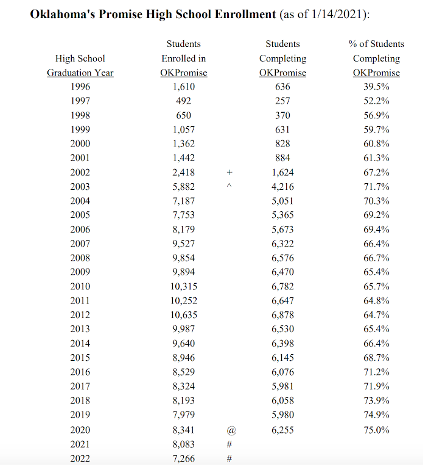
Now, for some reason, the Oklahoma Legislature wants to change it. Senate Bill 639, authored by Adam Pugh (R – Edmond), makes two significant changes to Oklahoma’s Promise. I like one, and I hate the other so much that I have flames coming out of my head.

The good change would be an expansion of Oklahoma’s Promise to include training for programs identified by the Department of Commerce as “critical occupation areas.” It makes sense. Not every high school graduate wants to go to college, nor do they need to. If we can help people gain qualifications to begin a career, we should. Again, it’s good public policy. Once we have 25 years of data on this change (as we do with Oklahoma’s Promise), I bet the investment will prove worthwhile.
The bad change – and the word bad is really not strong enough here – is a clawback provision that would require students who don’t complete their program to pay the state back. I’m curious here…when we provide tax credits to companies that in turn lay off employees, do we ask them to repay the state? Nevermind. I’m going off on a tangent.
When questioned on the floor of the Senate about this provision, Pugh offered the following defense:
“We have got to stop with the bigotry of low expectations in this building.”
Ahh, the bigotry of low expectations. It was a garbage line in 2000 when W was pitching his vision for public education, and it’s a garbage line now. It’s also completely contradicted by fact.
I still know some of the people who work in the Oklahoma’s Promise office at the State Regents. They have a passion for the program and dedication to the students who benefit from it. They also have receipts. Here are a few more data points from their annual report.
For one thing, Oklahoma’s Promise students have higher high school GPAs than students who aren’t enrolled in the program. This is likely due to the well-understood importance of having students set goals and regularly discuss them with the adults in their lives. It also speaks to the importance of school counselors and strong guidance programs.
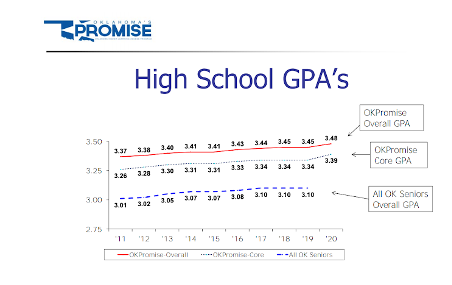
They have higher ACT scores.
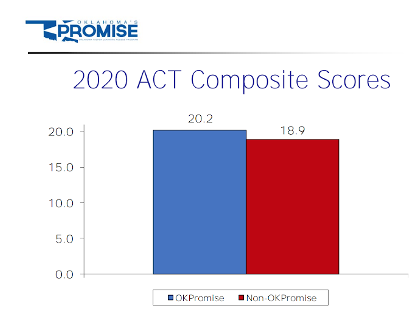
They have higher college-going rates…
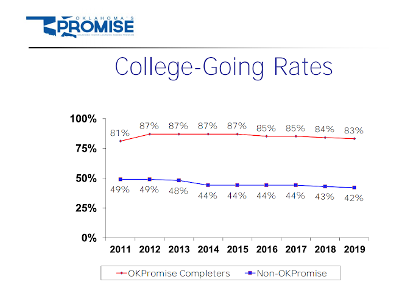
…and lower college remediation rates.
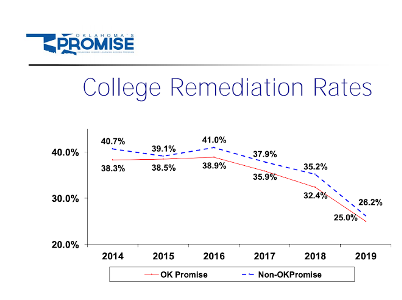
Oklahoma’s Promise students have higher college GPAs…
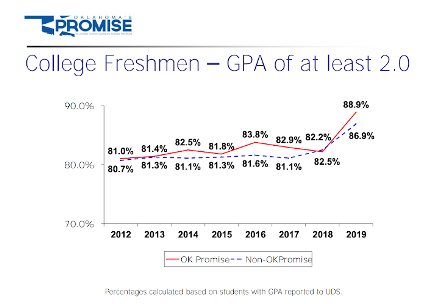
… as well as better persistence rates into their sophomore year…
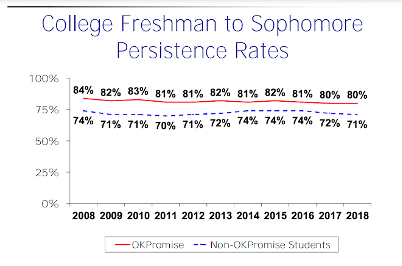
… and degree completion…
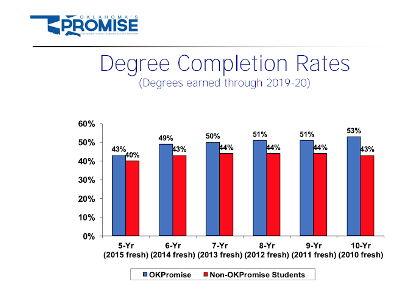
… and postgraduate employment.
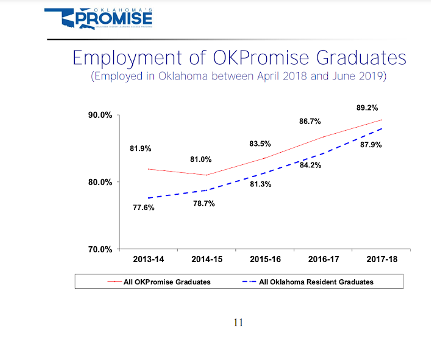
Let’s be clear. Nobody has low expectations for the Oklahoma’s Promise financial aid recipients. They’re Oklahoma’s most reliable college students. It seems to me that they keep their promises better than the Oklahoma Legislature does.
College is hard for many people, and for many reasons. An endless number of scenarios can complicate the time span between a student’s matriculation and anticipated graduation. Many of these are out of their control. We need to remember that as Oklahoma taxpayers, we subsidize the education of all students at our public institutions of higher education. Senate Bill 639 would only punish the poor ones who don’t finish.
If you believe that people with means (read: privilege) are the only ones who should have the opportunity to advance themselves, maybe you support this bill. On the other hand, if you believe that the investment Oklahomans have made for a quarter century in the education of students who might otherwise miss out is worth it in spite of the ones who don’t reach the finish line, you should fight this bill with every fiber of your being. We can’t tell people to try, but we’ll punish you if you fail.
Please contact whoever represents you in the House and ask them to vote against SB 639. Or at least ask them to fix it. Leave the good part in. Take the bad part out.

Relationships
Somewhere in Oklahoma this year, there is a sixth grade student who does well in school, but could do better. He’s not a mean kid, but he gets in trouble – in class, at lunch, on the bus – quite a bit. He’s just bored and restless. He’s friendly, but an easy target for bullies. And two of his core teachers are in their first year.
I know this student exists somewhere in Oklahoma because I’m not a unicorn. I was that kid, at Whittier Middle School in Norman, in 1981. Throughout my K-12 years, I was talkative, sometimes defiant, and yet fortunate enough to have teachers who believed in me. One of them was Debra Baum, who I had for sixth and seventh grade math.
After I finished middle school, I didn’t see Debra for years. She wasn’t there when my own children started school there 25 years later. The other first year teacher from 1981 still was, and she remembered me, which blew my mind. We caught up, and I remember being the first student she ever assigned detention, not that any of that matters now.
No, the next time I saw Mrs. Baum was at Norman High School a few years ago when my daughter was there. We didn’t really catch up, but it was good to see her. She’s reached out before to let me know she has followed my career and that she’s proud of me. As someone who preaches about the value of relationships, it has extra meaning for me that my own former teachers are still proud of me.
Then yesterday, this happened:
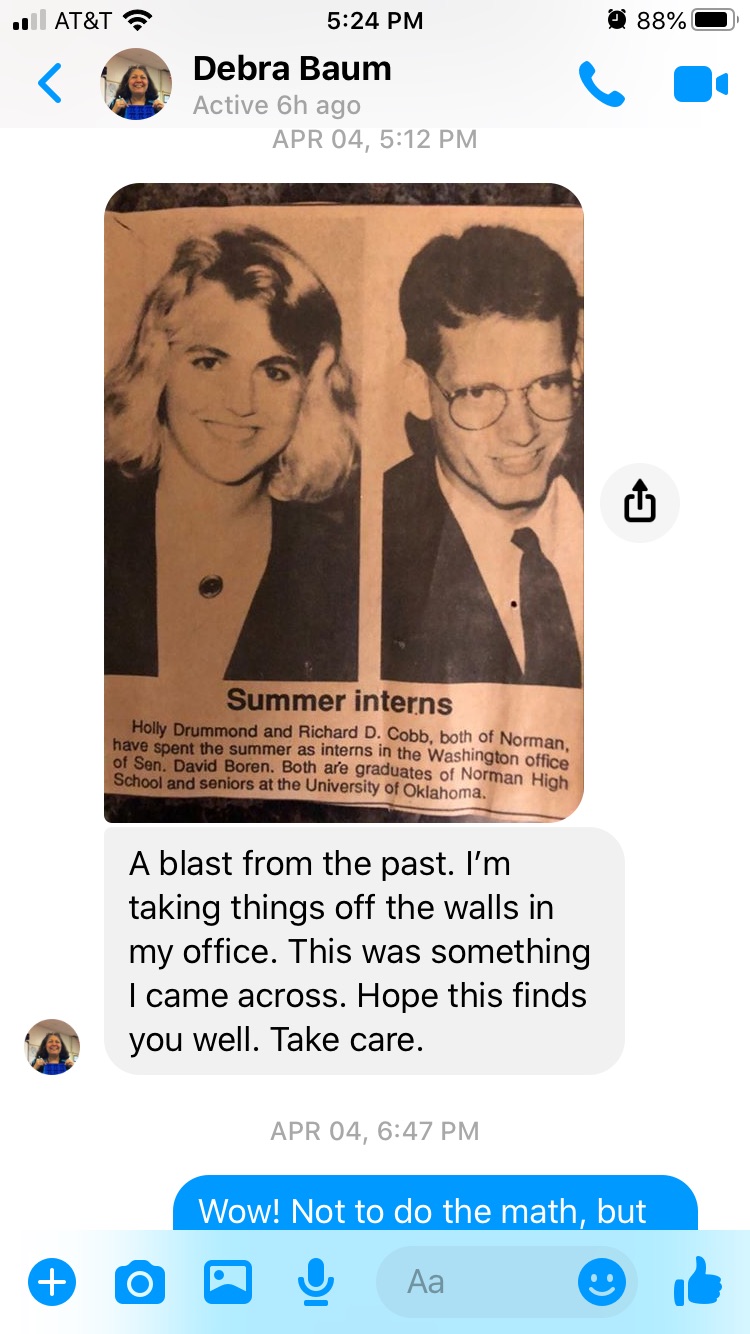
I’m not going to describe my reaction in full; suffice it to say that I was deeply moved. This means that eight years after having me in class Debra saw an article about me in the newspaper and cut it out. Now she has saved it for almost 30 years.
I realize that I’m really dating both of us here, but whatever.
I’m a grown man, a father of three, a husband, a superintendent to over 14,000 students and more than 1,600 employees. With everything going on in my life right now, I can still be caught off guard by a teacher I had in 1981 reaching out to me out of the blue.
Now imagine that I’m that same sixth grader, home for an extended spring break and the world breaks out into a historic pandemic. What that DM meant to me yesterday pales in comparison to what teachers contacting their current students means to them now. They need to hear our voices. They need to know we care – and not just about their STAR scores and AP exams.
None of us think that what we end up doing the last quarter of this school year will replace what we had planned to do. Instead, we get to focus on two things that matter more than grades and standardized tests: relationships and learning for the sake of learning.
Prior to Spring Break, when the magnitude of the pandemic was starting to sink in, districts around Oklahoma shot into action, working on plans to feed children, communicating proactively, and looking at ways to finish the school year under circumstances none of us could have predicted. Months from now, we’ll look back on this time and find countless things we could have done differently. I’m sure of that.
I just hope we don’t look back and wish we had done more to show our students that we care about them.
Collectively over the last few weeks, we’ve grieved over so many things. When this all started, my district had four teams headed to the state basketball tournament. They don’t get to win or lose it on the court now. We have track teams and jazz bands that wanted to defend their state championships. That’s a no go. We’ve canceled rites of passage, such as prom, and we’re all scrambling to plan alternate graduation ceremonies.
None of this is ok, but this is where we are. When we call our students, it’s perfectly acceptable to tell them that. In fact, it’s probably a really good thing to tell them that the adults are scared and uncomfortable too. Kids can usually tell whether we’re telling the truth or not anyway.
Eventually this will all end. We will go back to doing many of the things we’ve always done. Some things will be different forever, though. I hope the way we value each other is one of them.
Take care, and stay safe.
9 days to go: vote #oklaed

Yesterday, on a beautiful October afternoon (during which both OU and OSU had homecoming parades), a group of public education advocates gathered at the Capitol to remember why we walked out in April and to focus on the education vote in the upcoming election.
I would agree with Oklahoma Watch’s assessment. Yes, it was a small crowd, but it was pretty vocal. Many of the speakers were dynamic. I was also there.
The Oklahoman had this to say about the rally:
Many teachers hope the election will result in more lawmakers who are willing to increase the state’s education budget.
“I’m here today because education is so important,” Kim Schooler, a fourth-grade teacher at Truman Elementary in Norman, said. “It is the key to everything. That’s why I’m a teacher.”
Amanda Jeffers, a candidate for House District 91 who teaches English at Crooked Oak High School in Oklahoma City, told the crowd she walked out in April because “giving teachers a moderate pay increase doesn’t fix the problems we face in the classroom.”
I was one of the speakers yesterday as well, and a couple of people have asked me to post my comments. Here’s what I had written in advance, though I probably ad libbed a bit:
So…what does that ideal, pro-education candidate, in the most generic sense possible look like? Since I can’t endorse anyone specifically today, let me paint you a picture.
A candidate who supports public education understands that health care, corrections, and addiction issues ARE public education issues.
A candidate who supports public education knows that you can’t increase teacher pay by giving us more flexibility with how we spend our building fund. Whether it’s a quarter or five nickels, it’s still 25 cents.
A candidate who supports public education reads, engages, and votes. And walks around the Capitol with teachers when they’re fighting for our profession.
By the way, a candidate who supports public education knows that the teacher walkout was about WAY more than teacher pay.
A candidate who supports public education is involved with – and ideally, leading the way – helping us all understand how adverse childhood experiences shape the gap between what is taught and what is learned.
A candidate who supports public education is someone who has been paying attention to the policy and funding issues that have been hurting our schools…for more than just the last few minutes.
A candidate who supports public education knows that public schools already have academic accountability and fiscal transparency, as required by more laws than I can count.
A candidate who supports public education also knows that vouchers would take public school dollars and send them to private schools that lack accountability and transparency.
Finally, a candidate who supports public education is someone who is more concerned with doing right by school children than with his or her political future.
So far, friends, 2018 has been a landmark year. Many of the legislators who have tried to cut this state into prosperity have changed their tune. Others decided they didn’t want to stick around. Some, well, some we have just fired. Keep voting for better candidates. Keep voting for public education. Keep voting for the future.
With that said, do you know who your candidates are? Do you know where your polling place is? Do you have a plan to take the time to vote on November 6th? Our state has come too far for any of us to stay on the sidelines and let other people make decisions.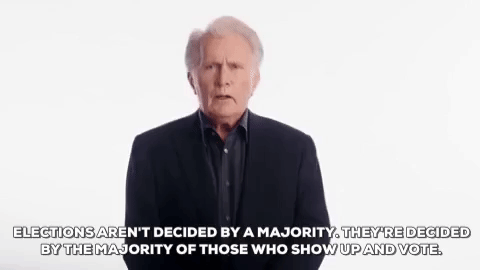
Why Trauma-Informed?
In 2008, after my grandmother passed away, I was putting the contents of her dresser into a plastic bucket so that the movers could pack and move everything out of her room at her retirement community. I didn’t have much time, but I stopped and looked at many of the things she had kept. Old pictures of my mom and her brother. A birth certificate from one of her siblings who died in childhood. Veterans benefits notices. Booklets of Green Stamps.
And for some reason, my first grade report card.
At the end of the school year, my teacher commented that I had become angry and disagreeable during the fourth quarter. That makes sense to me. That’s about when my parents split up.
Please understand, I’m not looking for sympathy. Or empathy. What was hard for me at age six has turned out to be one of the best things that ever happened in my life. I was probably in my 20s before I really got that, but objectively, it couldn’t have worked out better. In short, I got to experience a step father who loved and appreciated my brother and me probably more than he really had to. And I loved him dearly up to his death five years ago.
And okeducationmom has never let me down.
My parents divorced in 1977. We lived in a small town. Certainly everyone knew about it, but that doesn’t mean they could relate to it. With 40 years of hindsight, it’s easy to see that I would have benefited from having a teacher who got it. I don’t mean that I needed a teacher who understood what I was going through; rather I could have used a teacher who at least understood that I was going through something. Clearly I was lashing out irrationally.
I probably didn’t do that again until about 2012, when I started blogging.
I wouldn’t have really framed it this way then, of course, but I was suffering, as a six-year-old, from trauma. This was the defining event of my childhood. Parents divorcing is that event for many of our students in Oklahoma. For others, it’s abject poverty. Or living in a home with someone suffering from addiction. Or losing a parent or sibling. Or a parent being incarcerated. Or a debilitating illness – whether you can see it from the outside or not.
We must accept this reality, and understand that we, as educators, are incapable of understanding all of the different traumas that our students experience. Fortunately, the Oklahoma State Department of Education and many school districts in Oklahoma (including Mid-Del) have started focusing on this.
In May, State Superintendent Joy Hofmeister announced that this would be a point of emphasis for her and her staff:
It Starts Here: Trauma-Informed Instruction will be held at the Cox Convention Center in Oklahoma City on Tuesday, Oct. 2, and feature experts in childhood trauma and healing. In partnership with state agencies, tribal nations and nonprofits that serve children and families, the OSDE’s in-depth event will target educators who are often the first to encounter trauma in individual children.
“A recent National Survey of Children’s Health revealed that Oklahoma’s youngest, most vulnerable children suffer more trauma than those in any other state in the nation, and additional trauma rankings among our children of all ages are alarmingly high,” Hofmeister said.
“We must come together to understand the complex issues surrounding Adverse Childhood Experiences (ACEs) in order to serve the hundreds of thousands of affected children in our classrooms and provide a path forward that is infused with resilience and hope. When we think of the importance of giving all Oklahoma children access to a high-quality education, there may be no more critical work than to ensure a foundation of safety and caring. We cannot allow these frightening statistics to remain unchecked.”
In our district, we’ve given a ten-question ACE quiz to our administrators and the teachers at many of our schools. It’s a good activity because participants can (if they choose to) share their score without discussing any specific trauma if they choose not to.
My score was a six. I’ve shared with you one reason why, and that’s all you get. It’s my story. It’s my childhood. And that’s the one part of it that I’m comfortable sharing.
Someone else’s score of a six might be different than mine. Another person’s three might have given them more trauma in childhood. Or maybe someone’s score of one. The point isn’t the number. The point is the child.
As educators, most of us can’t relate to the experience of a child who has an incarcerated parent. What we can do, however, is get to know that child and learn what that child needs from us. It’s not enough for us to teach reading, math, science, history, music, or anything else. Recognizing that we have students who need more than curriculum is the point of developing trauma-informed schools.
It’s not to stereotype different traumas and generalize their results on kids. It’s not so that we can manage our expectations.
Trauma doesn’t change the fact that a student’s starting point is not the sole determinant in who he or she becomes as an adult.
Here’s more from the OSDE press release:
Research indicates that the impact of childhood trauma can be mitigated through trauma-informed educational instruction practices that focus on relationship-building, resilience, hope and positive interactions. Addressing students experiencing trauma is part of Oklahoma Edge, the OSDE’s 8-year strategic plan for strengthening public education in the state.
In Oklahoma, nearly half of school-aged children have an ACE score of 3 or higher, which is strongly associated with negative long-term health outcomes including disproportionate rates of divorce, depression and violence.
“Hundreds of thousands of Oklahoma children are academically at risk and on a path to shorter, more difficult lives as a result of childhood trauma,” said Hofmeister. “Seeing our teachers stand up for kids is not news, but at the It Starts Here summit, we will equip them with the tools specific to childhood trauma that will enable them to be even fiercer champions of their students.”
Maybe this means having more counseling supports in place for children. Maybe it indicates a need for mentors or better mental health services. For years, we’ve known that there are students in our schools who lack positive adult interactions outside of our buildings.
We also have known for years that there are some amazing single parents, foster parents, and grandparents out there raising children.
That doesn’t mean that the trauma ceases to exist, though.
As with any good movement in education, I fear that this will turn into a collection of buzzwords and generalizations. I hope to God it doesn’t, though. We need to understand our kids, even the ones with experiences that we can’t relate to.
I’m thankful that the OSDE and Superintendent Hofmeister are taking a visible lead in this important work. I’m thankful for those in our district adding to the effort.
I will continue to learn everything I can about childhood trauma. More importantly, I will continue to learn how I can help the students I serve.
